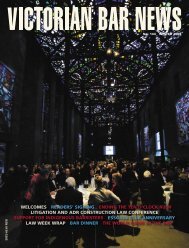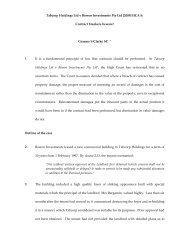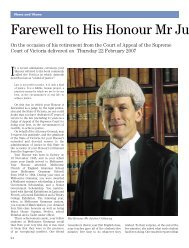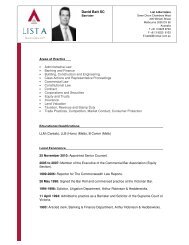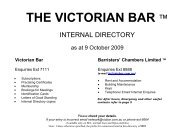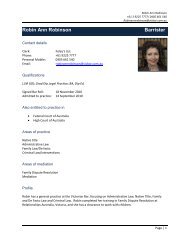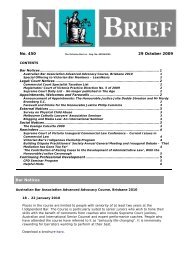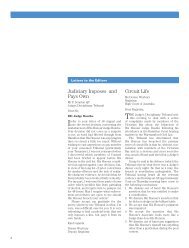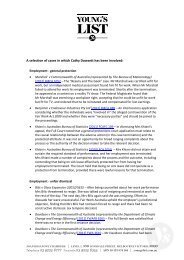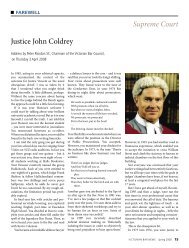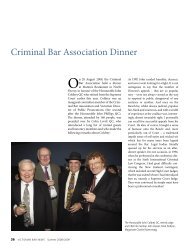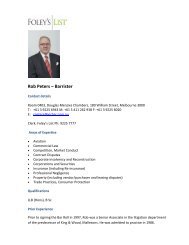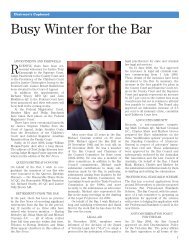Justice William Charles Crockett AO - Victorian Bar
Justice William Charles Crockett AO - Victorian Bar
Justice William Charles Crockett AO - Victorian Bar
- No tags were found...
Create successful ePaper yourself
Turn your PDF publications into a flip-book with our unique Google optimized e-Paper software.
he gives the air of a man in charge of thesituation.” This was true. He was a firstclass trial and appellate judge and alwaysin his court was in charge of the situation.At the outset of his judicial career hisefficiency and desire to analyse the issuesquickly and get on with the matter causedsome counsel to consider him rather“prickly”. That soon settled.At the time of his appointment a memberof the common law <strong>Bar</strong> and who hadfrequently appeared against <strong>Crockett</strong> wasJohn Mornane. Mornane would do almostanything to get an early brief before a newjudge conducting a jury trial. This was tothe disquiet of a number of new judgeswhose practices at the <strong>Bar</strong> had been thatof equity lawyers. In an early trial before<strong>Crockett</strong> and a jury, and while counselfor the plaintiff was addressing the jury,Mornane in a voice which could be clearlyheard said that he had made a note of acomment of his opponent as being “dishonest”.<strong>Crockett</strong> immediately sat downcounsel for the plaintiff and told Mornaneto stand. He then said to him that if therewas one more interruption from himLL.D for <strong>Crockett</strong> JReprinted from Summer 1995 <strong>Victorian</strong> <strong>Bar</strong> NewsIN September this year one of the greatcommon law judges of the <strong>Victorian</strong>Supreme Court “Bill” <strong>Crockett</strong> wasawarded the degree of LL.D. (HonorisCausa) by the University of Melbourne.This recognition of his Honour’s serviceto the law and the outstanding rolewhich he has played on the SupremeCourt is richly deserved.The editors are delighted to printbelow the address which his Honourgave to the graduates on that day.A great English barrister F.E. Smithwas a famous orator. He became LordChancellor as Lord Birkenhead. All lawgraduates will have heard of him — atleast I hope they have. His services as aspeaker were difficult to obtain. An oldfriend, the headmaster of a great school,managed to procure him as occasionalorator to speak at the school’s annualspeech night. Birkenhead, who was avery prickly fellow, expected to speakearly and then get away. However, hewas forced to sit through the lengthyprocess of the award of prizes, schoolreports and so on to his mountingchagrin and his perceptibly lesseningpatience. At last the headmasterannounced: “And now Lord Birkenheadwill give you his address.” The LordChancellor strode to the lectern andsnapped, “22 Picadilly, London, SE2”,turned on his heel and departed.I wondered whether I might employthe same tactic. After mature considerationI thought not.First of all, Chancellor, may I say howgreatly honoured I am by the Universityand Council by the conferment upon metoday of the degree of Doctor of Lawshonoris causa. I am, of course, awarethat that degree is one of the most prestigiousawards which is within the gift ofthe University to bestow.I am also most beholden to Councilfor the generosity of the sentimentsexpressed in the citation given insupport of the award. May I just addthat I am particularly delighted that theaward in recognition of any contributionI may have made to the law has comefrom my own university.Next, may I congratulate all thosewho have graduated today and particularlythose who are taking out their firstdegree. My bachelor’s degree was conferredjust half a century ago, I think tothis very month. I am afraid that aftersuch a lapse of time which has broughtme close to God’s “use-by date” that Irecall nothing of the event itself. However,it must be so as the Universityof Melbourne Law Society has on thebasis of alumni records recently mademe an honorary life member in recognitionof the fact. That conferment was,of course, held on this site but in thatgreat example of Australian bluestonegothic, the old Wilson Hall, which waslater destroyed by fire. However, I doremember the great relief it was to havefinally reached the end of my immediatetertiary education.I am sure you, too, are feeling thatsense of relief that the grind of endlessstudy is — at least for most of you — atan end.I know I felt then, and I hope youfeel now, a sense of indebtedness tothe University which has given you theopportunity to acquire knowledge and,perhaps more importantly, the thirst tocontinue to do so. You can now call theUniversity of Melbourne your universityand speak of it with pride as the greatteaching institution which it is and ofwhich you and I have been privilegedto be a part.If the opportunity arises to repayin some measure that debt, do not failto accept it. I must confess I have feltguilty in the past of doing too little torepay the University for what it didfor me. I tutored the correspondencestudents, participated in a few mootsand for some years undertook the taskof correcting the examination papers ofProfessor Zelman Cowan’s students asto which incidentally if there is a moredreary way of earning a dollar I have yetto hear of it.It was much later, when I was asenior judge, that I realised that I hadin fact been doing rather more for theUniversity than I thought had been thecase. That was work done as assessorfor the Governor of the day in his capacityas Visitor to the University. BeingVisitor does not mean that Mr McGarviemay call socially on the Vice-Chancellorfor a sherry or two. The term has a technicalmeaning and the office itself is oneof ancient lineage.Perhaps a brief description of it maybe of some interest to you.In the Middle Ages what were tobecome great university colleges or hospitalsin England were founded by thehigh and mighty. They might be membersof the Royal Family, aristocrats orsenior churchmen but always they werepersons of great wealth. That wealthwas needed to establish the institutionin question. It was a kind of medievalequivalent of today’s “every gift over$2 is tax deductible”. At all events, thefounder originally had the right to visitto see how his money was being spentand how his heirs were being deprivedof their inheritance. It is a commonlyheld belief that that right had becomeobsolete by the 19th century unlessexpress statutory provision for its existencehas been made.Indeed, real doubts existed until relativelyrecently as to whether the principalright that had for centuries been22



